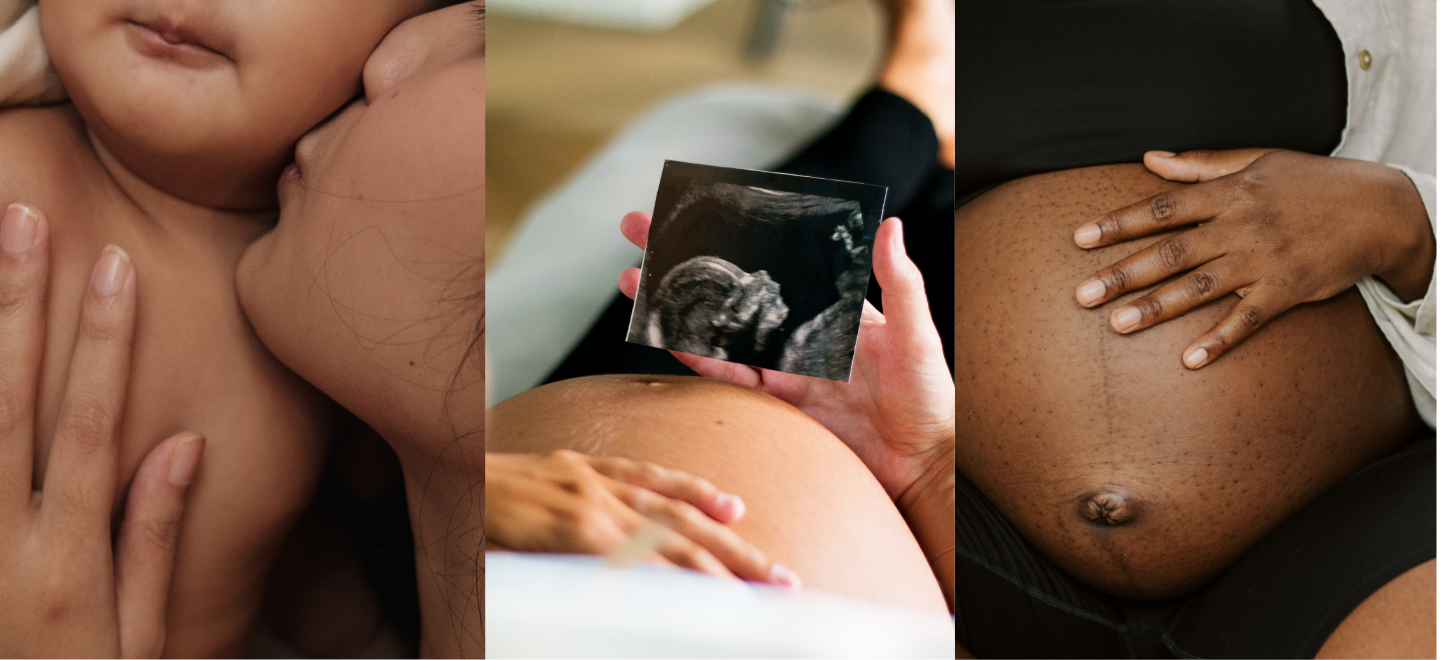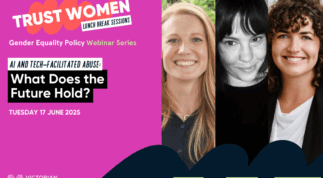Please note: The Victorian Women’s Trust supports women, girls and gender-diverse people, and affirms our respect for all birthing experiences. While this article uses ‘women’ and ‘mother’ interchangeably, it is in no way meant to undermine and/or exclude the experiences of non-binary parents.
We also realise the survey sampling is not technically random, and as such, cannot be considered as wholly representative. Nonetheless, we are confident in the power of people’s stories. Women’s accounts of their experiences reveals a pattern which cannot be ignored, and calls for deeper exploration.
“The birth culture we have isn’t woman-centred, it’s about having a healthy baby and pushing the mum to the wayside.”
– Amber-lee Buendicho, Founder of The Power of Birth
In a healthcare system that has been shaped by medical misogyny, women are frequently characterised as incapable and entirely dependent on medical professionals. Compounding this is the experience of being dismissed as ‘hysterical’, a form of gender bias and discrimination that two-thirds of women in Australia have experienced at the hands of their healthcare providers. This archaic convention flows into obstetrics, where the baby is often positioned as the priority and the mother as an afterthought, like an item on a production line.
Pregnancy is a defining period in the lives of women, babies and families, and for many women, the memory of giving birth lasts a lifetime. Quality maternity care safeguards the physical and mental wellbeing of mothers and their babies; positively shapes the maternal bond between the mother and child; and fosters a sense of agency for new parents.
The national strategy ‘Women-centred care: Strategic directions for Australia’s maternity services’, released in November 2019, outlined the future of Australia’s maternity services. Since its release, notable publications such as the Australian Birth Experience Study, the NSW Birth Trauma Inquiry, and Deakin University’s national survey on maternity care experiences have questioned the effectiveness of the strategy. Each publication emphasised the need for informed consent, better education, continuity of care, and better support systems, indicating that Australian maternity services did not excel in any aspect of the national strategy.
These publications, along with direct concerns raised with the Victorian Women’s Trust, compelled us to create a space for women across Victoria to share their own maternity care experiences. In 2024, we conducted a survey to better understand the current state of the sector. The responses reveal a collective story of a system that, despite the dedication of many healthcare professionals, has left too many women feeling disempowered, disrespected, and unsupported. In an affluent country like Australia, it is unacceptable that women continue to feel devalued and diminished in their healthcare experiences.
Birth characteristics of survey respondents
Over 3 months, we heard from 76 participants, many of whom provided detailed reflections about their experiences. The majority of respondents gave birth in metropolitan areas (84%) while the rest gave birth in regional and rural areas (16%).
58% of mothers gave birth in a public hospital, with 33% having given birth in a private hospital, and a small percentage of respondents (9%) opted to give birth at home. Of the participants surveyed, almost half (49%) had a vaginal birth, while 18% had an elective caesarean birth, and the rest had an emergency caesarean (21%) or an assisted vaginal birth with forceps, vacuum or an episiotomy (11%).
Almost half of the participants (47%) had no birth complications, while the rest had a variety of complications — with some having more than one: perineal tears (32%), a retained placenta (8%), haemorrhage (16%), shoulder dystocia (1%) and other complications (4%).
What are some of the common experiences mothers face with their care providers?
76% of mothers surveyed felt there could be changes to improve their overall experience of pregnancy, birth and post-birth. While each birth story is unique, common threads emerged that illustrate the realities women face in the birthing suite.
Respect:
“I was always treated like I could have stopped this, as it ‘was all in my mind’.”
For many respondents, respectful, compassionate and skilled providers made all the difference, while for others, interactions marked by dismissal, coercion or negligence left lasting emotional scars. While our survey supports experiences of compassionate and supportive care providers, women’s experiences have also revealed that the system can fall short of providing adequate support and respectful treatment.
“No one took my needs seriously because I ‘didn’t scream enough’. I shouldn’t have to scream to be listened to and taken seriously.”
Agency:
“The entire process felt like a sexual assault that I had to grin and bear.”
In Australia, the law dictates that pregnant patients are presumed to have the capacity to make decisions unless there is evidence to the contrary. Our survey has shown that for some, this sense of agency was protected and uplifted, particularly in home-births and in the private system. But for too many others, it was undermined by rushed decisions, unclear communication or practices that left them feeling pressured and uninformed.
“My first birth was traumatic and so was the second. I will never recover from the stripping away of bodily autonomy at the hands of midwives and obstetricians.”
“She pressured me into taking sleeping tablets when I was in labour, denying I was in labour but refusing to examine me. Her refusal to accept my assessment that I was in labour and her minimising my pain made me question myself and feel I couldn’t cope.”
Mothers also described distressing experiences of medical interventions administered without their consent — sometimes leading to complications — which deeply undermined their sense of bodily autonomy.
“The obstetrician gave me an episiotomy when I didn’t want one that has never properly healed.”
“I was not listened to about not wanting strong painkillers. They administered it anyway and I promptly passed out. It was a terrible experience, I didn’t know where I was and forgot I’d even given birth.”
These experiences also affected their relationship with their child and, in some cases, discouraged them from having another.
“This experience changed my life and my family’s life forever. It had a huge impact on my mental health and wellbeing, and the bond between me and my daughter. We are still healing.”
“I still have trauma from my experiences giving birth 10 years ago. I never had a second child, I’ve experienced a decade of mental health issues and chronic pain and my marriage became very stressful and then ended.”
Support people:
“Feeling scared and traumatised and not being allowed a support person compounded the negative experience of my first birth.”
Across the survey, women spoke about the profound impact of emotional and physical support during labour. This was especially prevalent during the COVID-19 lockdown restrictions. Many wished for more understanding and compassion for a support person to be present during such an isolating period.
On the flip side, some welcomed the ‘no visitors’ policy as it allowed for uninterrupted rest and complete focus on the baby throughout their hospital stay.
“The time I could spend focusing on feeding and healing was wonderful, given there were no interruptions by visitors.”
Education and support:
“Right from the first prenatal questions, I realised that all classes were impersonal and inadequate.”
Our responses show how access to education, preparation and postnatal support can influence confidence, healing, and long-term wellbeing and how its absence can leave new mothers feeling unprepared and overwhelmed.
Furthermore, though most participants deemed their hospital stay to be adequate, some pointed out that there is an emphasis on prenatal care and that more focus on postnatal care was needed, especially on breastfeeding education.
“There was so much focus on preparing for birth and baby and managing pregnancy that I didn’t get told that my body would need extra care post birth. Caught me out and I damaged my pelvic floor post birth by trying to do too much (weeding/cleaning bottom cupboards) post birth, and it took years to resolve”
Intimate Partner Violence
“It was not safe to talk about it to anyone”
Women are at a greater risk of experiencing violence from an intimate partner during their pregnancy, with 1 in 8 women experiencing violence by a current partner for the first time during their pregnancy. Approximately 9% of our respondents reported experiencing violence during their pregnancy, and about half of them indicated that their care provider did not ask them about it.
One respondent was even read through a checklist of questions on intimate partner violence by a maternal health nurse while their partner was present.
A workforce in crisis
“To better support women in the public system, a huge overhaul is needed. Care providers need more time and less patients to adequately provide the support required for birthing mothers and their families.”
While respondents acknowledged the maternity care workforce’s constraints, namely the staff shortage and immense workload, many felt it could not be an excuse for poor care. Beyond individual practice, there was a clear call from our survey for systemic reform in workforce capacity and the foundational approach to care.
“I wish the government understood that they would have saved themselves an absolute bucket of money if they’d just provided adequate maternity care at the outset.”
Conclusion
From the stories shared in our survey, there is a clear call for a maternity care system that prioritises not only clinical excellence but also kindness, respect, and self-determination. An ideal healthcare system for mothers informs and empowers them to make decisions while recognising and doing their best to accommodate various physical, emotional, socioeconomic and cultural needs.
“When we talk about birth trauma, the conversation must be wide enough to encompass our lack of best-practice care. Because addressing birth trauma is not just about addressing physical trauma; it’s about making an emotionally, culturally and medically safe birth environment available to all.”
– Rhea Dempsey, Childbirth educator and counsellor, birth attendant and author of Birth with Confidence and Beyond the Birth Plan
The Victorian Women’s Trust is dedicated to building a world where women, girls, and gender-diverse people can embrace all of life’s opportunities with respect, safety, and dignity. The true measure of a prosperous nation lies in its commitment to equality and equity. We are, therefore, delighted by the federal government’s plan to invest $662.6 million over the next five years to strengthen and support the health workforce, including the maternity sector. A truly affluent country ensures universal access to care, so everyone, regardless of identity, income, or background, can receive the quality support they need.
Acknowledgements:
To everyone who shared their story with us — we would like to express our heartfelt gratitude to you, including those who were unable to complete the survey. Your courage in recounting your stories and the strength you have shown in facing your trauma have not gone unnoticed. We recognise that sharing your experiences can be challenging and, at times, distressing. This study would not have been possible without your honesty and willingness to share, and for that, we sincerely thank you. We deeply appreciate your candour and resilience and dedicate the results and future directions of this project to you.
We would like to express our sincere gratitude to the organisations and experts who generously contributed their time and feedback to our survey: Women’s Health Victoria, Women’s Health Goulburn North East, and Midwife Paula Medway. We extend a special thanks to Dr. Susie Allanson for bringing this issue to our attention, providing invaluable feedback on our survey, and offering her ongoing support throughout this project.
Support Services:
If any of these topics interest you, you can learn more at PANDA (Perinatal Anxiety & Depression Australia), Birth Trauma Australia, and Maternal Health Matters.
If this article has raised any issues for you, please reach out to the following helplines:
- PANDA (Perinatal Anxiety & Depression Australia): 1300 726 306
- 1800 RESPECT: Call 1800 737 732, text 0458 737 732 or chat online.
- Lifeline: Call 13 11 14, text 0477 13 11 14 or chat online.
- Beyond Blue: Call 1300 22 4636 or chat online.
 Devini Raj Kumar is a Master of Public Health graduate. With a passion for women’s health and gender equality, Devini has dedicated her voluntary efforts to various non-profits and the Royal Women’s Hospital. When she’s not engaged in advocacy, you can find her escaping into the world of historical fiction.
Devini Raj Kumar is a Master of Public Health graduate. With a passion for women’s health and gender equality, Devini has dedicated her voluntary efforts to various non-profits and the Royal Women’s Hospital. When she’s not engaged in advocacy, you can find her escaping into the world of historical fiction.



